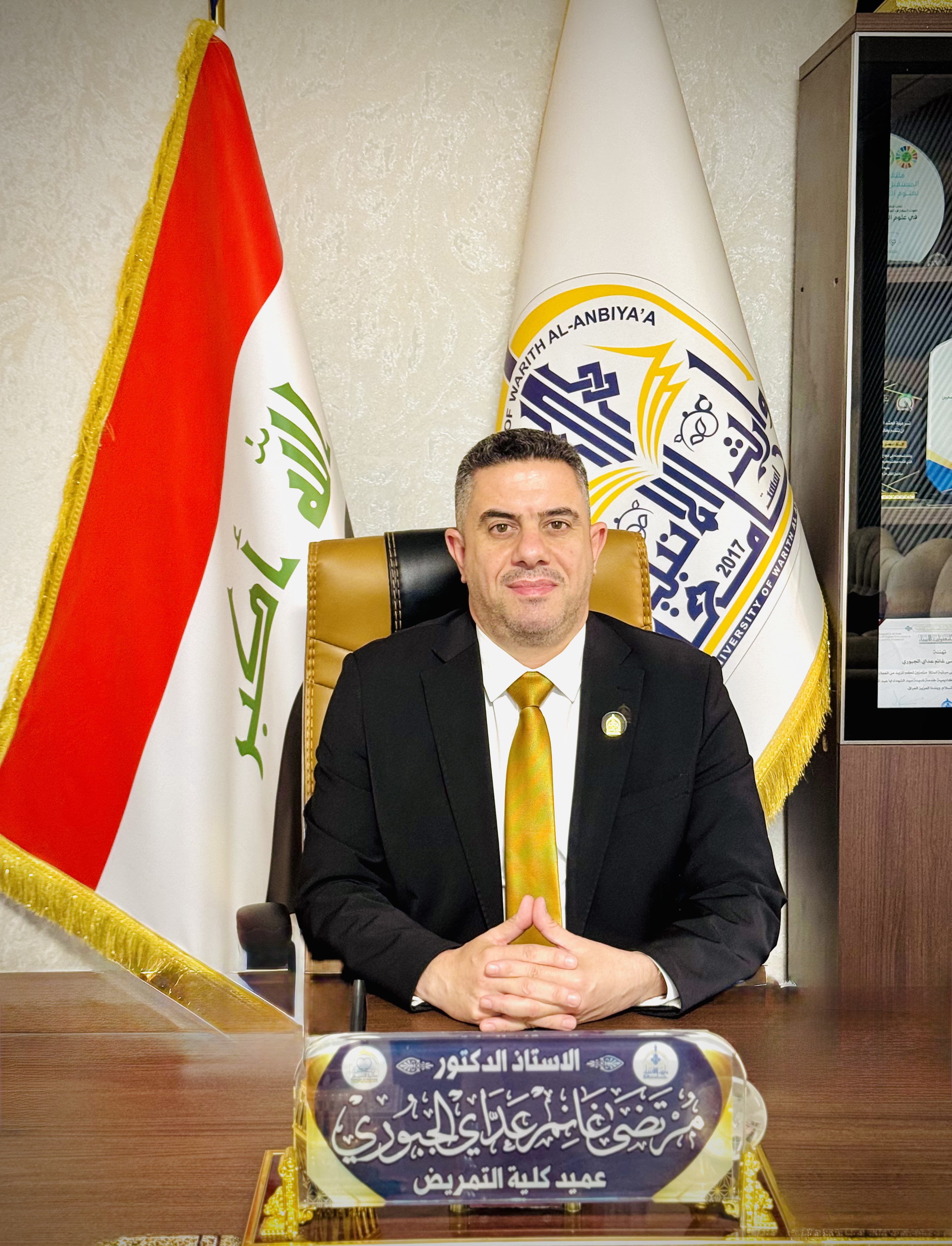


تهاني وتبريكات كلية العلوم الاسلامية بميلاد السيدة فاطمة الزهراء (عليها السلام)
ترفع كلية العلوم الإسلامية جامعة وارث الانبياء (عليه السلام) أسمى آيات التهاني والتبريكات ممزوجة بأطيب النفحات الى مولانا صاحب الزمان (عجل الله تعلى فرجه الشريف ) ولمراجع الدين ولجميع المؤمنين والمؤمنات بذكرى مولد سيدة نساء العالمين فاطمة الزهراء (عليها السلام ).
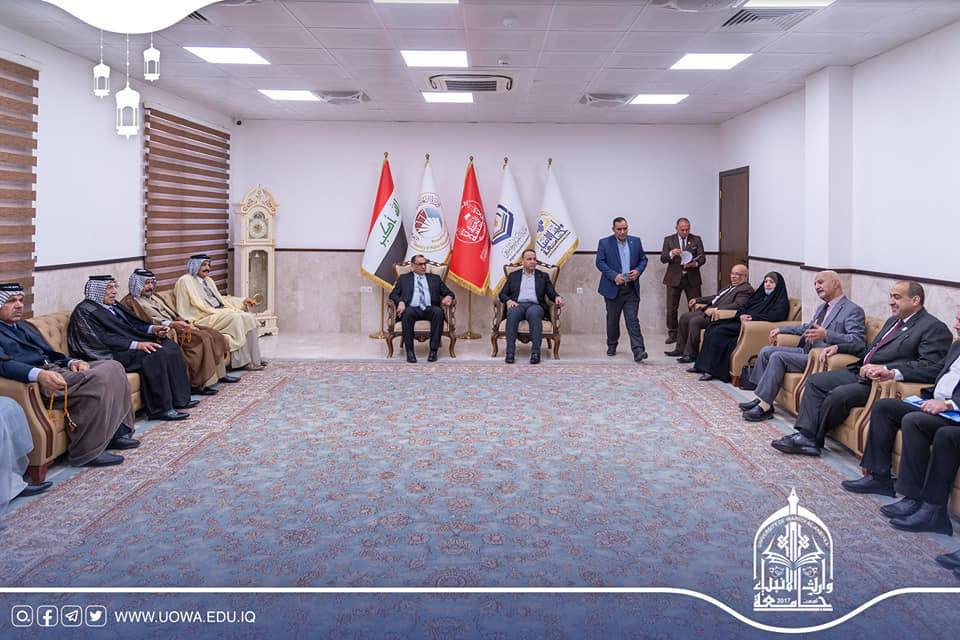
The University of Warith Al-Anbiyaa, through its College of Law, recently hosted a seminar exploring the role of Iraq’s original tribes in supporting societal peace.
Held on 31 January 2024, the seminar brought together academics, government representatives, tribal leaders, and community stakeholders. By creating a space for diverse voices to share insights, the university facilitated a meaningful dialogue on how tribal customs can complement formal legal systems in resolving disputes and strengthening social cohesion — a cornerstone of sustainable, resilient communities.
Discussions highlighted practical examples of community-led conflict resolution and examined strategies that can help communities and institutions work more effectively together. By fostering these exchanges, the seminar naturally contributed to peaceful, inclusive institutions, reinforced resilient and cohesive communities, and encouraged collaborative partnerships across sectors.
This event exemplifies the university’s commitment to bringing knowledge, tradition, and policy together, helping to inform decision-making and support solutions that benefit society broadly. Through initiatives like this, the College of Law plays a vital role in nurturing dialogue and partnerships that advance long-term societal well-being.
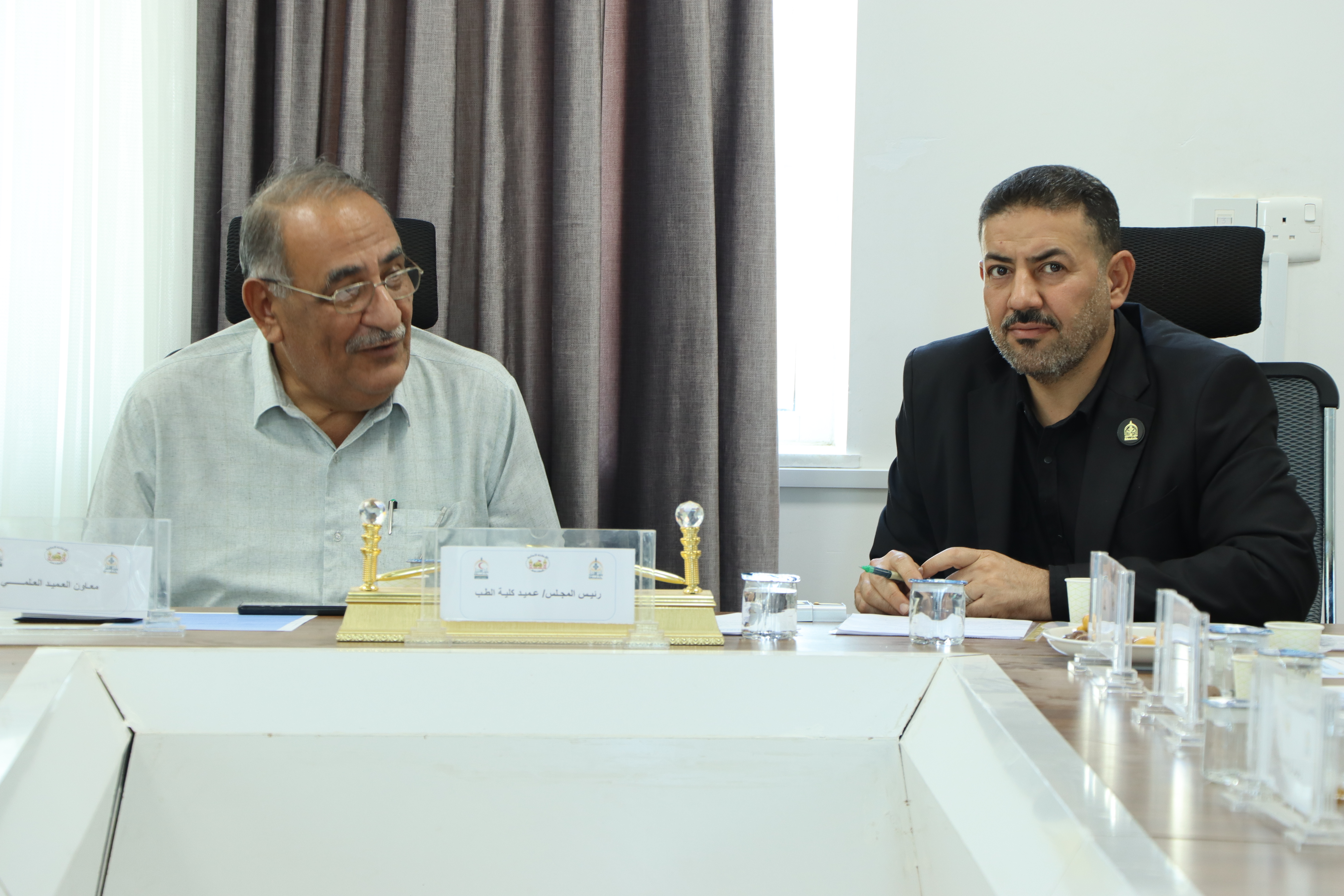
التعاون بين جامعة وارث الأنبياء وكلية الطب بجامعة كربلاء يركز على:
تعد جامعة طهران للعلوم الطبية من المؤسسات الرائدة عالميًا في مجال التعليم الطبي. من خلال التوأمة مع هذه الجامعة:
تشمل هذه التوأمة:
هذه التوأمة ليست مجرد شراكات، بل هي خطوة استراتيجية نحو بناء جيل من الأطباء والباحثين القادرين على مواجهة التحديات الصحية عالميًا بأفضل الطرق.

The University of Warith Al-Anbiyaa has been actively engaging in international collaborations that contribute to the gathering, measurement, and analysis of data relevant to the Sustainable Development Goals (SDGs). Through partnerships with global institutions and participation in international initiatives, the university has helped advance evidence-based decision-making in areas critical to sustainability and societal development.
During 2023–2024, the university co-hosted the First Global Conference on Crowd Engineering and Management in Karbala, bringing together international experts to discuss sustainable crowd management strategies. The insights and data shared at the conference support SDG 11: Sustainable Cities and Communities, enabling better planning and modelling for urban resilience and safety.
The university also collaborates with international research partners on studies that directly contribute to SDG-related data collection. For example:
Additionally, the university participates in the UI Green Metric initiative and the UN Academic Impact Network, both of which involve systematic data collection and benchmarking on sustainability practices. These efforts help track performance, compare with global best practices, and provide reliable evidence to guide institutional and policy decisions, reflecting principles of SDG 17: Partnerships for the Goals.
Through these initiatives, the University of Warith Al-Anbiyaa demonstrates that its role extends beyond research and education: it acts as a partner in international knowledge networks, contributing meaningful data, analysis, and collaborative insight to advance the global SDG agenda.
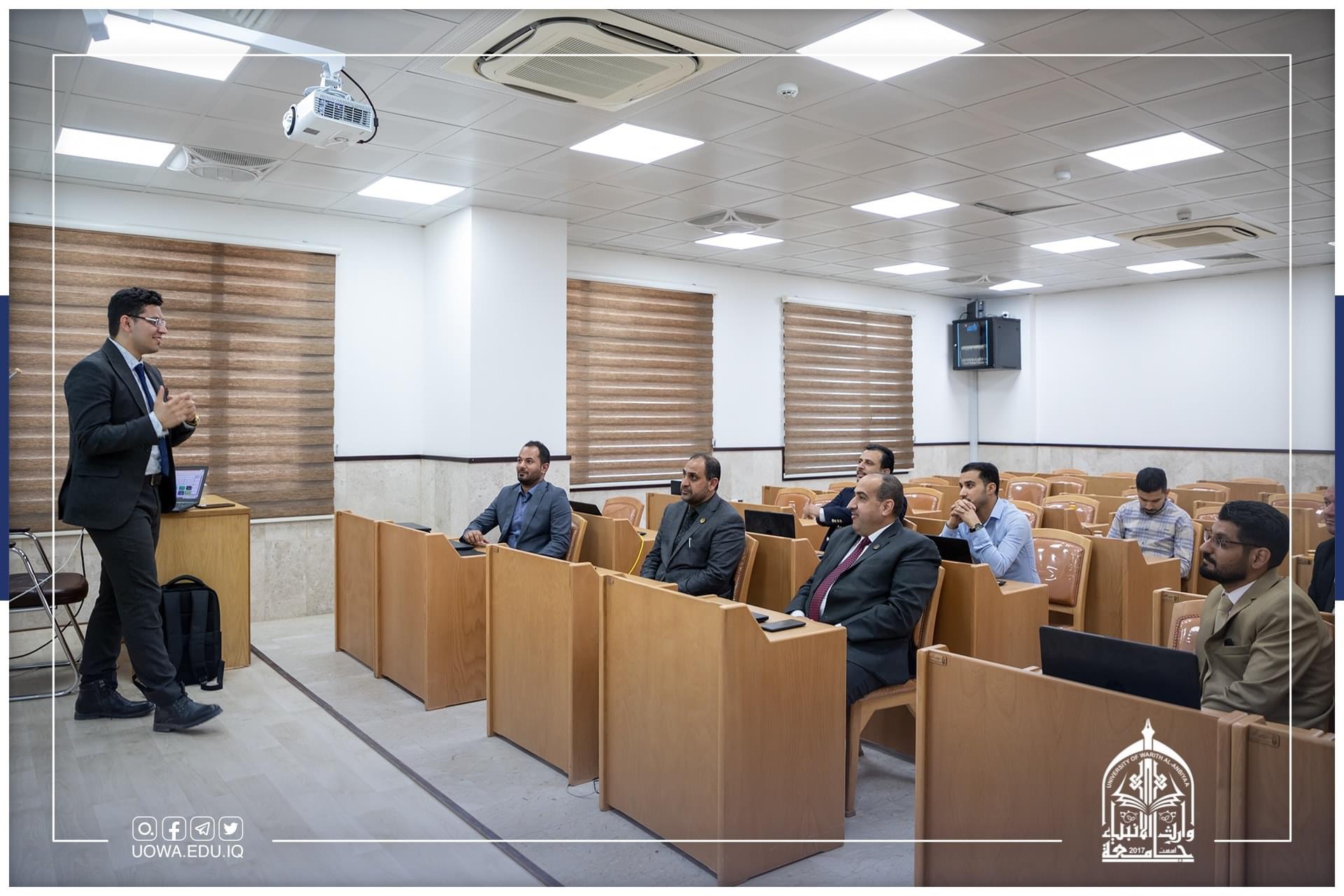
أطلقت جامعة وارث الأنبياء (عليه السلام) برنامجًا إلكترونيًا مبتكرًا لتنظيم عمل اللجان الامتحانية، بحضور رئيس الجامعة الأستاذ الدكتور إبراهيم الحياوي، والمساعد العلمي الأستاذ الدكتور عباس الدعمي.
تم تصميم البرنامج من قبل المهندس حسن محمد من كلية الهندسة، الذي أوضح أن البرنامج يتميز بقدرته على تقليل 90% من الجهد والوقت المطلوب من أعضاء اللجان الامتحانية. كما يسهم في تسريع وسهولة الحصول على نتائج الطلبة ووثائقهم بشكل دقيق وفي وقت قياسي، مما يعكس تقدم الجامعة في اعتماد الحلول التقنية لتطوير الأداء الأكاديمي والإداري.
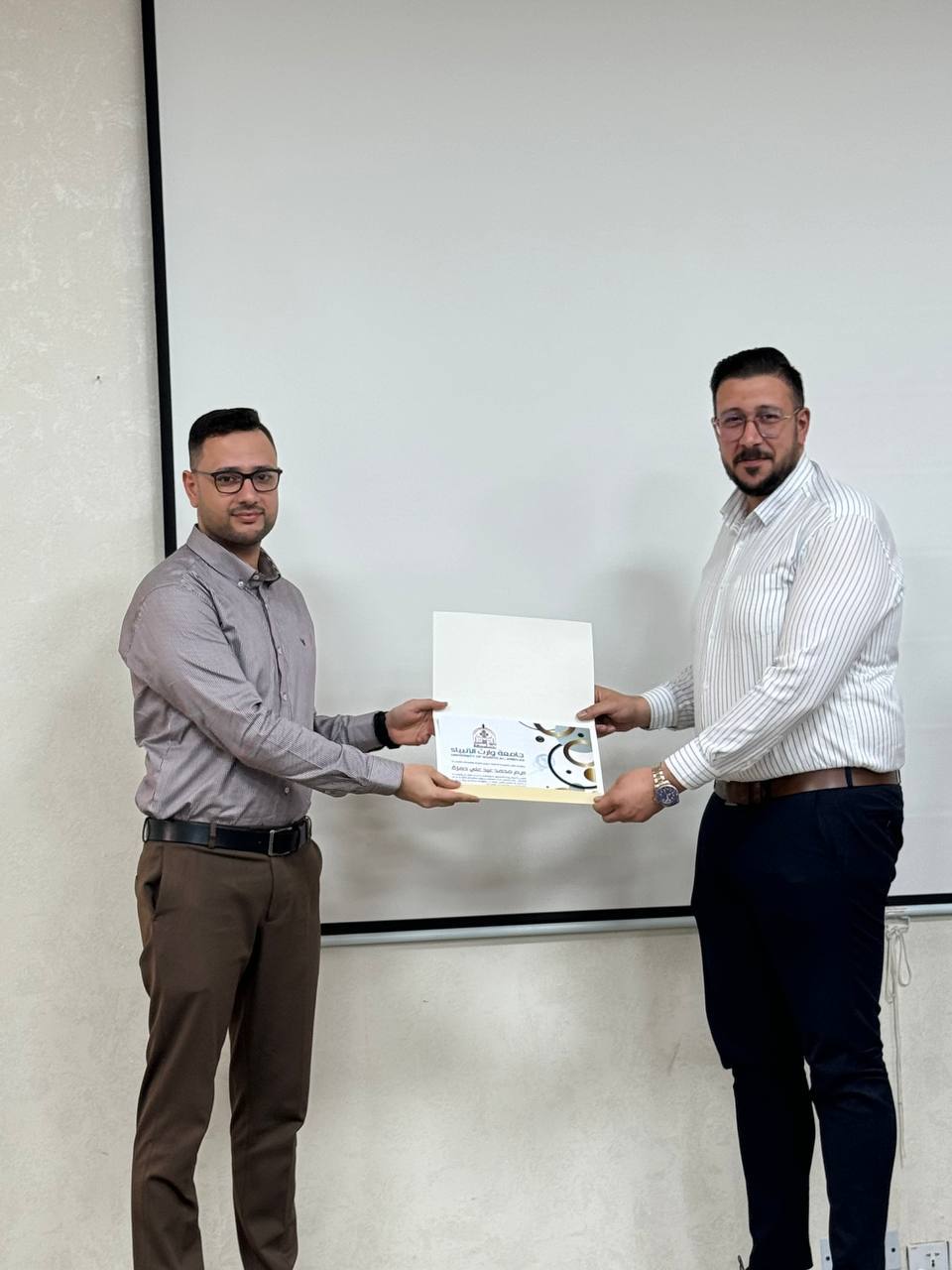
احتفت كلية العلوم باليوم العالمي للفيزياء الطبية في 7 نوفمبر 2024، بحضور أساتذة وطلبة الكلية. بدأ الحفل بتلاوة آيات من الذكر الحكيم، تلتها كلمة لعميدة الكلية، الأستاذ المساعد الدكتورة شيماء حسين نوفل، التي أعربت عن فخرها بإنجازات طلبة الكلية وأعضاء هيئة التدريس.
وأكدت الدكتورة نوفل أهمية التخصصات العلمية، قائلة: "إن ما حققه طلبتنا اليوم يعكس التزامنا ببناء جيل متميز قادر على تطوير الوطن." كما سلطت الضوء على أهمية الفيزياء الطبية ودورها الحيوي في تحسين عمليات التشخيص والعلاج الطبي.
اختتم الاحتفال بتكريم الطلبة الأوائل من قسمي الفيزياء الطبية وتكنولوجيا المعلومات للعام الدراسي 2023-2024، مع تشجيعهم على مواصلة السعي لتحقيق التميز والابتكار العلمي.
Comprehensive Support for Low-Income Students Policy
(Effective Date: 22/12/2022)
Approved by: University of Warith Al-Anbiyaa
The purpose of this policy is to provide comprehensive support to students from low-income families, ensuring that financial, logistical, and personal challenges do not prevent them from completing their studies at the University of Warith Al-Anbiyaa. This policy aims to foster an inclusive and supportive environment by offering essential services such as food, housing, transportation, and tailored assistance for economically disadvantaged students.
This policy applies to all students enrolled in all programs at the University of Warith Al-Anbiyaa who are identified as coming from low-income backgrounds.
The University of Warith Al-Anbiyaa commits to supporting students from low-income backgrounds by providing essential services and tailored assistance. The policy covers the following areas:
The university monitors the use of support services to ensure that eligible students benefit fully. Misuse of services or fraudulent applications may result in suspension of access to the services.
This policy will be reviewed every three years to assess its effectiveness. Adjustments will be made based on changing socio-economic conditions, evolving student needs, and feedback from stakeholders, including students, faculty, and staff.
For inquiries and further assistance, please contact:
Student Services Office
Email: [email protected]
Phone: +964 773 489 6226
Implementation Strategy
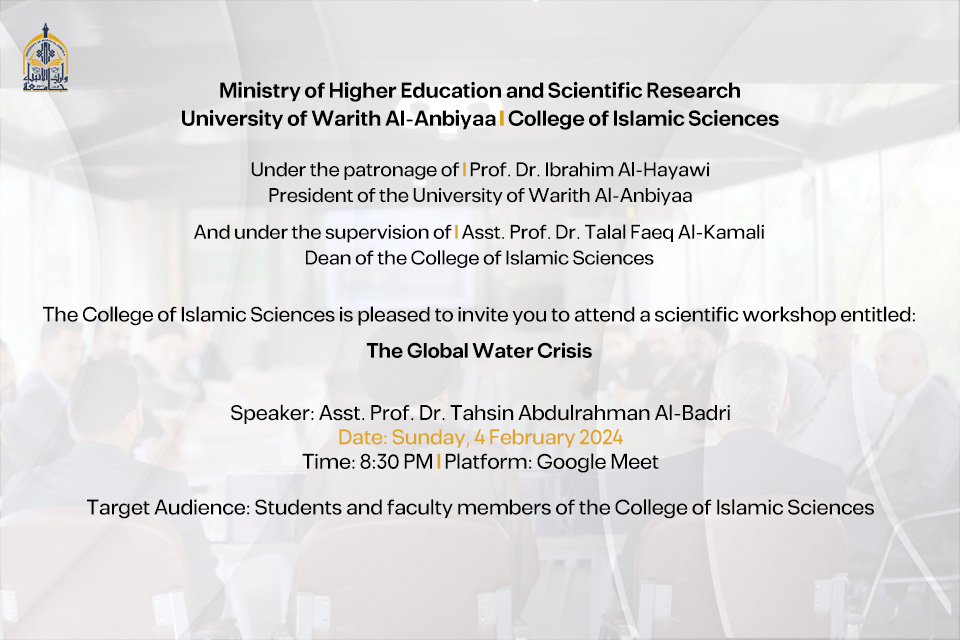
The University of Warith Al-Anbiyaa, through its College of Islamic Sciences, has taken a proactive role in shaping national and regional discussions on sustainable water management — a critical theme within the United Nations Sustainable Development Goals (SDG 6: Clean Water and Sanitation).
On 4 February 2024, the College organised a workshop titled “Global Water Crisis”, delivered online via Google Meet by Assistant Professor Dr Tahseen Abdulrahman Al-Badri. The session brought together university students, faculty, and representatives of local government authorities, creating a multi-stakeholder dialogue that bridged academic insight with policymaking practice.
Dr Al-Badri’s presentation examined the root causes of the global water crisis and framed them within the Iraqi and regional context, identifying challenges that governments and communities currently face. He proposed comprehensive, multi-level strategies — including local, regional, and international interventions — which align with Iraq’s water security priorities. A formal solution proposal was prepared and submitted to relevant authorities, marking the university’s contribution to policy development and actionable planning.
The workshop also incorporated policy modelling and scenario planning, contrasting possible futures with and without immediate interventions. This approach strengthens the capacity for adaptive management, enabling government and non-governmental actors to adjust policies as conditions evolve.
Supported by the Ministry of Higher Education and Scientific Research and under the sponsorship of University President Prof. Dr. Ibrahim Al-Hayawi and Dean Dr. Talal Faeq Al-Kamali, this initiative demonstrates the university’s direct involvement in national SDG policy development. It reflects a commitment not only to advancing scientific research but also to providing government and non-governmental bodies with the evidence base and community engagement tools necessary for sustainable water management.
Through such initiatives, the University of Warith Al-Anbiyaa continues to act as a trusted academic partner in addressing Iraq’s most pressing environmental and societal challenges and in shaping adaptive, policy-driven solutions in line with the SDGs.

Dear colleagues and students, I extend our warmest congratulations and best wishes on the start of the new academic year.
Our faculty and staff are committed to achieving academic excellence in various fields of research and study.
We are confident in the ability of our students to succeed and reach their academic and professional goals. We encourage active participation in cultural and research activities, as well as fostering relationships with scientific institutions and community service programmes to positively impact the scientific and social environment.
We are dedicated to enhancing the college's infrastructure to provide a modern and advanced learning environment. We ask our students to take their academic journey seriously and to strive for excellence in all they do. We appreciate the hard work of our professors and administrators and encourage students to respect their efforts in ensuring academic success.
Success should not be the end goal but rather the pursuit of excellence. We thank the entire college team for their significant contributions and responsibility towards God and the nation. We call on everyone to work together in elevating our college to a successful model in the national, regional, and international educational arena.
We have great hope that the college will continue to achieve real qualitative development, both academically and socially. We wish you all good health, wellbeing, and success in the coming academic year.
Best regards,
Assistant Professor Dr. Shaimaa Hussein Nofal
Dean

In the name of Allah, the Most Gracious, the Most Merciful.
Peace and blessings be upon our Holy Prophet Muhammed, the noblest of all creation, and his family.
The College of Engineering is a private college affiliated with the University of Warith Al-Anbiyaa. It was established in 2017 and comprises three departments: Biomedical Engineering, Civil Engineering, and Air Conditioning and Refrigeration Engineering. Our goal is to produce competent engineers who possess both theoretical and practical knowledge in their field.
Our faculty members hold advanced academic degrees, and our engineering and administrative faculty are experienced and skilled in guiding students towards success and development. Our college has various specialised scientific laboratories, engineering workshops, and advanced programming systems to enhance students' skills and capabilities.
We plan to open new scientific departments in the future to meet market needs and contribute to the reconstruction and revival of our country.
In conclusion, our college strives to keep up with the latest scientific and technological advancements, and we are committed to producing competent engineers who can contribute to the development of our country.
Dr. Hussein Hadi Hussein


Peace be upon you, and may the mercy and blessings of Allah be upon you.
Since the establishment of the College of Nursing at the University of Wraith Al-Anbiyaa in 2017, it has shouldered a significant responsibility towards community health. The college aims to build and prepare highly competent nursing staff through its academic and training programmes for students. It aims to acquire necessary skills and knowledge based on solid scientific foundations in the field of nursing sciences to prepare a generation of university-level male and female nurses capable of contributing to the advancement of the nursing profession in healthcare institutions and providing high-quality services through university-level education methodology.
The college has derived its comprehensive plans from the strategic goals set by the university. The college aspires to be one of the leading nursing colleges nationally and regionally. It seeks to advance nursing sciences and scientific research. The college also contributes to community service through the application of the scientific curriculum. It provides an exemplary educational environment that supports the development of the nursing profession.
The College of Nursing directs a significant portion of its attention and focus towards the importance of conducting sound applied scientific research by its faculty and dedicates the results of these research endeavours towards meeting the community's needs and addressing its problems on a prioritised basis for all categories, thus achieving sustainable development.
Dr. Mortada Al-Jubouri
Dean of the College of Nursing

The College of Islamic Sciences in Brief
The College of Islamic Sciences was established with a commitment from the Presidency of the University of Wraith Al-Anbiyaa and the College's Dean to promote Islamic Sharia in theological, moral, and legislative fields. It also aims to represent it practically in reviving humanity and society.
Our college specialises in the study of Islamic sciences within multiple departments, which currently include the Department of Jurisprudence (Fiqh) and its Principles and the Department of Quranic Sciences. It attracts students from preparatory schools, offering both morning and evening programmes.
College Objectives
The college endeavours to prepare a group of scholars and researchers in Islamic sciences to study Sharia through academic methods. In this regard, our college seeks to achieve the following objectives:
- Prepare a group of individuals who strive to bridge the academic and social gap between religious seminaries (Hawza) and academic universities.
- Prepare social and religious reformers who are dedicated to guiding society and enriching it with religious teachings and concepts, disseminating them among all social strata through the qualifications provided by the college.
- Train academic faculty for preparatory schools and universities
- Prepare qualified religious experts to work in courts as specialists in their respective fields to oversee the Sharia aspects of legal judgements issued by judges.
College Aspirations
The college's leadership aims to open new departments in addition to the existing ones, such as the Department of Jurisprudence (Fiqh) and its Principles and the Department of Quranic Sciences. While it initially focused on these two departments at the undergraduate level during its first year, it aspires, in the coming years, to open admissions to other departments and at higher levels, including master's and doctoral degrees. This is in pursuit of reviving the sciences of Sharia in all areas, including intellectual, theological, comparative religion, Arabic language, and Hadith studies.
Dr. Talal Faiq Al-Kamali
Dean of the College of Islamic Sciences
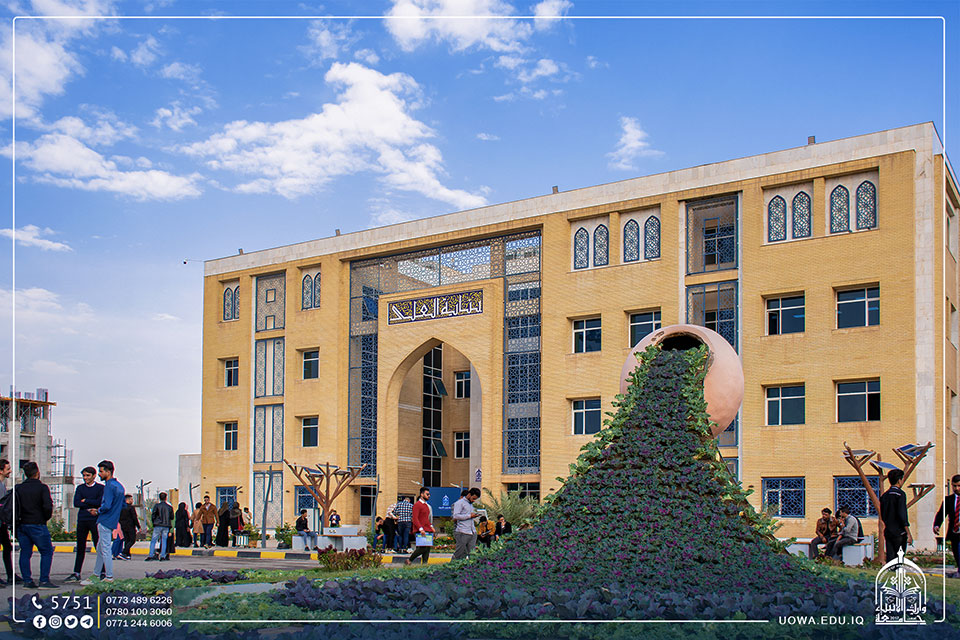
WE BELIEVE IN....

السلام عليكم ورحمة الله وبركاته
منذ تأسيس كلية التمريض في جامعة وارث الانبياء (عليه السلام) عام 2017 وهي تحمل على عاتقها مسؤولية كبيرة تجاه صحة المجتمع في بناء وإعداد كوادر تمريضية عالية الكفاءة من خلال برامجها الأكاديمية والتدريبية للطلبة، واكتساب المهارات والمعارف اللازمة المبنية على قواعد علمية رصينة باختصاص علوم التمريض لإعداد جيل من الممرضين والممرضات الجامعيين القادرين على المساهمة في تطوير مهنة التمريض في المؤسسات الصحية وتقديم الخدمات ذات الجودة العالية عن طريق منهجية التعليم الجامعي، وقد استمدت الكلية خططها العريضة من الأهداف الاستراتيجية التي وضعتها الجامعة، حيث تطمح الكلية أن تكون واحده من كليات التمريض الريادية على المستوى الوطني والإقليمي في تطوير علوم التمريض والبحث العلمي والمشاركة في الخدمة المجتمعية من خلال تطبيق المنهاج العلمي وتوفير البيئة التعليمية النموذجية التي تسهم في تطوير مهنة التمريض، حيث توجه الكلية جزء كبير من اهتمامها وتركيزها على أهمية اجراء الأبحاث العلمية التطبيقية الرصينة من قبل أعضاء هيأتها التدريسية وتكريس نتائج الأبحاث نحو تلبية احتياجات المجتمع وعلاج مشاكله حسب الأولوية لجميع الفئات وتحقيق التنمية المستدامة.
أ.د مرتضى الجبوري
عميد كلية التمريض
كلية الهندسة
تعد كلية الهندسة في جامعتنا مركزًا حيويًا للتعلم والبحث في مجالات متعددة من الهندسة، حيث يتم توفير بيئة تعلم متقدمة تجمع بين النظرية والتطبيق. ومع استحداث أقسام جديدة للعام الدراسي 2023-2024، توفر الكلية فرصًا أوسع للطلاب لاكتساب المعرفة والمهارات في ميدانات متقدمة.
تتسم الكلية بالالتزام بتقديم تعليم متميز يستجيب لتحديات المستقبل. تهدف الأقسام الجديدة إلى توسيع أفق الطلبة وتمكينهم من اكتساب خبرة عميقة في مجالات هندسية حيوية. يُشجع الطلاب على البحث والابتكار لتحقيق الاستدامة والتقدم في علوم الهندسة.
أقسام الكلية:
قسم الهندسة المدني
يُعتبر قسم الهندسة المدنية في جامعتنا محورًا أساسيًا لتطوير الخبرات الهندسية اللازمة لتصميم وإدارة البنية التحتية للمشاريع المدنية. يشمل القسم مجموعة من البرامج الدراسية التي تغطي مجالات ومفاهيم الهندسة المدنية بشكل شامل.
قسم هندسة الطب الحياتي
يُعتبر قسم هندسة الطب الحياتي في جامعتنا مجالًا متقدمًا يجمع بين مفاهيم الهندسة والعلوم الحياتية لتطوير وتحسين التكنولوجيا المستخدمة في مجالات الطب والصحة. يتناول القسم مجموعة متنوعة من المواضيع التي تركز على تطبيقات الهندسة في فهم وتحسين العمليات الحيوية وتقديم حلول للتحديات الطبية الحديثة.
قسم هندسة التبريد والتكييف
يُعتبر قسم هندسة التكييف والتبريد في جامعتنا مركزًا حيويًا لتعليم وبحث وتطوير التقنيات المتقدمة في مجال تكييف الهواء وتبريد الأنظمة. يهدف القسم إلى تدريب الطلاب على فهم وتطبيق مبادئ هندسة التبريد والتكييف في مختلف الصناعات والتطبيقات.
الاقسام المستحدثة للعام الدراسي الحالي 2023-2024
قسم هندسة الطائرات
إستحدث لهذا العام قسم هندسة الطائرات في جامعتنا، والذي يعتبرمركزًا متخصصًا في تدريب الطلاب على فهم وتطبيق مبادئ هندسة الطيران وتصميم وصيانة الطائرات. يتيح القسم للطلاب اكتساب المهارات الفنية والعلمية اللازمة للعمل في صناعة الطيران المتقدمة.
قسم هندسة النفط والغاز
قسم هندسة النفط والغاز ذلك القسم الحيوي الجديد، الذي يُعنى بتدريب الطلاب على فهم وتطبيق التقنيات المتقدمة في استخراج وإنتاج ومعالجة الموارد الطبيعية لصناعة النفط والغاز.
قسم هندسة الطب الحياتي
هو العلم الذي يختص بدراسه جسم الانسان من الناحيه الهندسيه حيث يعتبر حلقة وصل بين علم الطب والعلوم الهندسيه.
وتعتبر هندسه الطب الحياتي من احدث العلوم الهندسيه التي نشأت مع تطور الطب الحديث
وتأسس هذا القسم في جامعه وارث الانبياء (عليه السلام) عام 2017 واستقطب نخبه من التدريسيين والطلبه.
ويرتبط عمل المهندس الطبي بتخصصات كثيرة، وذلك يتيح له مجال واسع في العمل فعمله قائم على التعامل مع أطباء وممرضين من تخصصات كثيرة، حيث تجده في شركات تصنيع الأجهزة الطبية والمعدات وأماكن صيانتها، وكذلك تجده في المستشفيات والعيادات الطبية في أطار حيوي فيه كادر من الأطباء والممرضين. إن مستقبل المهندس الطبي يحمل الكثير من الإبداع والابتكار، ففي ظل التطور التكنولوجي الحديث واكتشاف ظهور إمراض جديدة، غالبا ما يوجد الحل من قبل المهندس الطبي، فهو العقل لابتكار أجهزة جديدة لحل المشاكل والتعقيدات التي تواجه عالم الأطباء بطريقة أسرع وأفضل وبكفاءة. ومن هنا يمكننا وصف المهندس الطبي بأنه مكمل حيوي للطبيب، فلا تكتمل مهارة الطبيب إلا بوجود عقل مهندس مبدع مبتكر على الادوات والاجهزة و المنظومات والمؤسسات الطبية.
مجالات عمل خريج هندسه الطب الحياتي:
1-العتبة الحسينية ومشافيها ومراكز الاطراف الصناعية.
2-دوائر وزاره الصحة.
3-وزارة الصناعة
4-وزارة البيئة
5-وزاره التربية/ دائره التعليم المهني
6-المراكز البحثية
7-صناع الاطراف الاصطناعية
8-صناعة مواد الطبيه والاعضاء الاصطناعيه
9-القطاع الخاص يتضمن المستشفيات الاهلية والشركات الاهلية للتدريب والتطوير
حرصت جامعه وارث الانبياء على تدريب طلبه قسم هندسه الطب الحياتي من المرحله الاولى .حيث تم تدريب الطلبه خلال العطله الصيفيه في مستشفى الامام زين العابدين (عليه السلام) على مختلف الاجهزة الطبيه وسيتم تدريب طلاب المرحله الثانيه في مركز الاطراف الصناعيه التابع للعتبه الحسينية المقدسة وبقية المراحل كافة سيتم تدريبها في المؤسسات التابعه للعتبه وبذلك تكون جامعه وارث الانبياء الوحيده في العراق التي تبنت تدريب الطلبه من المرحله الاولى لغايه التخرج ايماناً منها بتخريج طلبه كفوءين من الناحيتين العمليه والنظريه ومهيأين للدخول الى بيئة العمل.
يعرف اختصاص هندسة الطب الحياتي بأنه العلم الذي يشمل المعرفة بالعلوم الأساسية والهندسية ( الفيزياء، الكيمياء، الإحياء، الرياضيات، الكهرباء، الالكترونيات والميكانيك) والمعرفة التطبيقية المصاحبة لهذه العلوم إضافة إلى العلوم الطبية والحيوية.
ويعتبر تخصص هندسة الطب الحياتي(Biomedical engineering) من أحدث التخصصات الهندسية على الإطلاق ويرجع ظهور هذا النوع من الهندسة إلى التطور الكبير في الآونة الأخيرة بمجال الطب والذي يعتمد بشكل أساسي على الأجهزة الطبية الحديثة وفائقة التطور، مما استدعى تدخل العلوم الهندسية، ليشكل بذلك حلقة وصل بين الهندسة والطب بما يخدم صحة المرضى والإسراع بشفائهم بأذن الله.